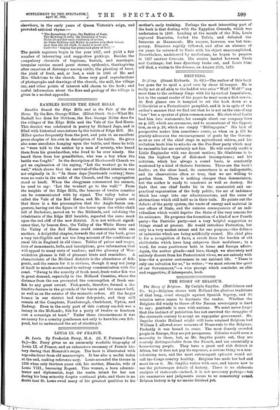DRIF rum.
Drifting. (Grant Richards. 2s. 6d.)—The author of this bock has gone far to spoil a good case by sheer ill-temper. He is really not at all akin to the faddist who cries " Wolf ! Wolf!" any more than to the ordinary Jingo with his hysterical Imperialism, but to the casual reader of his pages he must seem a first cousin. At first glance one is tempted to set the book down as a Collectivist or a Protectionist pamphlet, and it is in spite of the author's manner that we find out that he is not on the side of any "ism" but a speaker of plain common-sense. His rhetorical faults lead him into statements, for example about our company laws on p. 157, which are erroneous, and to accusations of the Opposi- tion, as on p. 28, which are simply "Billingsgate." His lack of perspective makes him sometimes comic, as when on p. 175 he gravely advocates the encouragement of goats by the Govern- ment as one of the chief steps in agricultural reform, and his irritation leads him to attacks on the Pro-Boer party which may be excusable but are certainly not fair. He will scarcely credit a Little Englander with one decent motive; Mr. Gladstone is to him the highest type of dishonest incompetence; and his criticism, which has always a sound basis, is constantly weakened by a kind of choleric fussiness. These are the book's faults ; on the other hand, its earnestness is so indisputable, and its observations often so true, that we are willing to pardon them. There is nothing cheaper than denunciation, but the author is ready to construct as well as destroy. He finds that our chief faults lie in the amateurish and un- practical organisation of the body politic, the air of indolence which has crept into our administrations, and the curse of abstractions which still hold us in their toils. He points out the defects of the party system, the waste of energy and material in our offices of State, and the ruinous consequences of an indi- vidualism which would deprive the State of the very reasons for its existence. He proposes the formation of a kind of new Fourth party— the Patriotic party—not a very helpful suggestion as things stand at present. He would introduce Protection, but only to a very modest extent and for one purpose,—the defence of industries which are being artificially ruined. His chief plea is for a recognition of facts, a revolt from the burden of old shibboleths which have long outgrown their usefulness ; in a word, for some positiveness both in home and foreign affairs. Again, the author pleads—and here, though we absolutely and entirely dissent from his Protectionist views, we are entirely with him—for a greater seriousness in our national life. "There is only one salvation for us," he writes ; "we must reform the spirit of our Government,"—a wise precept which concludes an able and suggestive, if intemperate, book.






















































 Previous page
Previous page